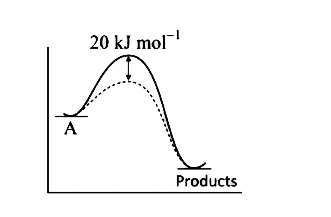A→ Product, [A]0=2M. After 10 min reaction is 10% completed. If d[A]dt=k[A], then t1/2 is approximately
0.693 min
69.3 min
66.0 min
0.0693 min
The correct Answer is:C
k=2.30310log10090=0.001054min−1
t1/2=2.303k=2.3030.001054≈66min
Topper's Solved these Questions
- REACTION KINETICS AND CHEMICAL EQUILIBRIUMBOOK - CENGAGE CHEMISTRYCHAPTER - REACTION KINETICS AND CHEMICAL EQUILIBRIUMEXERCISE - CHALLENGING EXERCISE
5 Videos
- RADIOACTIVITYBOOK - CENGAGE CHEMISTRYCHAPTER - RADIOACTIVITYEXERCISE - OLYMPIAD AND NTSE LEVEL EXERCISES
10 Videos
- THERMODYNAMICS AND THERMOCHEMISTRYBOOK - CENGAGE CHEMISTRYCHAPTER - THERMODYNAMICS AND THERMOCHEMISTRYEXERCISE - OLYMPIAD AND NTSE LEVEL EXERCISES
10 Videos
Similar Questions
A→ Product, [A]0=2M. After 10min reaction is 10% completed. If d[A]dt=k[A], then t1/2 is approximately
View SolutionConsider the reaction : A→B+C. Initial concentration of A is 1 M. 20 minutes time is required for completion of 20% reaction. If d[B]dt=k[A], then calculate half life (t1/2) of reaction.
View Solution
Knowledge Check
A→ Product, [A]0=2M. After 10min reaction is 10% completed. If d[A]dt=k[A], then t1/2 is approximately
A0.693minB69.3minC66.0minD0.0693minA first order reaction is 10% complete in 20 min. the time taken for 19% completion is :
A30 minB40 minC50 minD38 minFor a reation: A→ Product,
rate law is −d[A]dt=K[A]0.
The concentration of A left after time t when t=1K is:A[A]0eB[A]0×eC[A]0e2D1[A]0
A first order reaction is 20% completed in 10min, (70+h) min it take to complete 80% .What is h? (approximately) (log1.25=0.0969 )
View SolutionFor the following reaction,
A500K−−→ Products
A400K/catalyst−−−−−−−−→ Product
If (−d[A]dt)500K=−(d[A]dt)400K
no catalyst in presence of catalyst Then Ea is approximately :

View SolutionFor the following reaction,
A500K−−→ Products
A400K/catalyst−−−−−−−−→ Product
If (−d[A]dt)500K=−(d[A]dt)400K
no catalyst in presence of catalyst Then Ea is approximately :

View SolutionT50 of first order reaction is 10 min. starting with 10 mol−1 rate after 20 min is :
View SolutionConsider following two reactions
A→Product,d[A]dt=k1[A]00
B→Product,d[B]dt=k1[A]00
kaandk2 are expressed are expressed in term of molarity (mol L−1) and time (s−1) as :
View Solution
